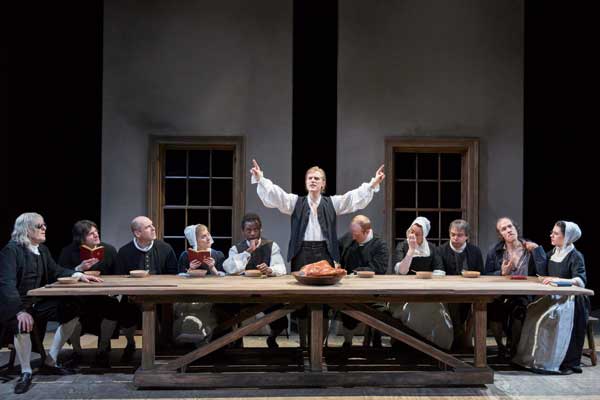A lap of honour at the Royal Court. Bruce Norris has been one of the big discoveries of artistic director Dominic Cooke, who takes his bow by directing The Low Road. Norris’s greatest hit, Clybourne Park, was a savage and illuminating satire about racism. His next trick is to examine the burning issue of the day, unfettered greed. A great start. But he can’t decide whether he’s for or against the profit motive. And he has no idea where to mount his attack.
He time-travels to 18th-century America and imagines an unscrupulous spiv, a bit like Barry Lyndon, who climbs from destitution to wealth and whose life touches American history at various crucial moments. The spiv is called James Trumpett — perhaps a clumsy echo of Donald Trump — and he’s also the bastard son of George Washington. Yeah, right, we get it. He’s capitalism incarnate. Subtler symbolism wouldn’t do any harm. Norris, it must be said, is a marvellous wordsmith and his eloquent pastiche of 18th-century rhetoric is a joy to listen to. But he wants his play to sound up-to-date so he showers it with expletives. Back then, cursing was rarely recorded in published writing so these harsh Viking words sound ugly and out of place. And it’s hard to love the thuggish, rapacious main character, Trumpett.
His ruthless greed is sharply contrasted with the sweet and noble personality of his African manservant, John Blanke, whom he purchases at a slave market. Norris likes writing black characters but he tends to depict them as morally flawless victims of white bigotry, and to endow them with miraculous levels of intelligence, virtue and wit. We’re told that John Blanke was enslaved in West Africa, freed by an English earl, educated to high table standard, named as heir to an estate and a peerage, and then ruthlessly dispossessed by the earl’s scheming daughter. Not a persuasive story.
Blanke drifts through all this frantic action while happily debunking the toffs and twits who try to take advantage of him. But he’s so statuesque and unflappable that he feels more like a genuflection to liberal myths than a flesh-and-blood human being with a tattered, grimy soul. His presence confirms a nagging suspicion about Norris: he’s a hostage of the left-leaning parochialism he once attacked with such venomous hilarity. Doc has caught the plague on his rounds.
And it’s ironic that the production feels like a boom-time blow-out laid on as a golden goodbye to one of the Court’s top performers. Excesses abound. The three-hour running time feels like an overnight stay. There are 20 characters, sporting a lavish array of costumes and wigs, who twice move from the past to the present in order to perform feeble comedy routines. And the take-home message — big deal! — is that individualism is bad but not entirely bad. You’d need a toot of coke to keep your eyes open if it weren’t for the starry performances. Ever-depend-able Kobna Holdbrook-Smith is beautifully assured and poised as John Blanke. Simon Paisley Day finds a lot of laughter in two unpromising parts. (Note to producers: SPD isn’t a journeyman thesp, he’s a comic star and deserves title roles.) And Bill Paterson, as the narrator, enchants the audience with a voice so toasty it could melt an igloo.
The King’s Head is staging a fascinating curiosity. Quasimodo, written by Lionel Bart in the early 1960s, has never received a full stage production. It’s patchily brilliant. Bart’s facility for knocking out charming two-minute ditties — like TV advertising jingles — prevents him from offering those big, heart-stopping arias that give musicals greatness and permanence.
The plot is very dense and sluggish. Quasimodo takes second place to the central character, Esmerelda, a voluptuous gypsy-whore whose honeyed charms attract a gaggle of jerks, stalkers and bad boys. There’s a pervy archdeacon, a rich toff and a winsome poet all competing for her hand. But the ugly hunchback beats them to it by giving her asylum in the filthy upstairs cloisters. This, too, is a problem. The Esmerelda and Quasimodo affair — or EsmiQuodo as we’d call it today — takes ages to develop and it lacks the enriching, life-enhancing magic of a great musical romance. Both the gypsy and the crookback are desperate, sexless misfits who exchange chaste glances in the cobwebby crannies of a Gothic masterpiece. Imagine two immigrant cleaners fondling each other in a Treasury broom cupboard. It’s depressing rather than uplifting.
Robert Chevara’s handsome, well-drilled cast do a marvellous job. Their pitch-perfect voices radiate energy and truth and they perform marvels on a cramped stage, supported by just three musicians. There’s no big band to hide behind. And they need no concealment. Could Quasimodo become a permanent fixture in the musical theatre repertoire? Maybe. But this show doesn’t entirely convince.







Comments